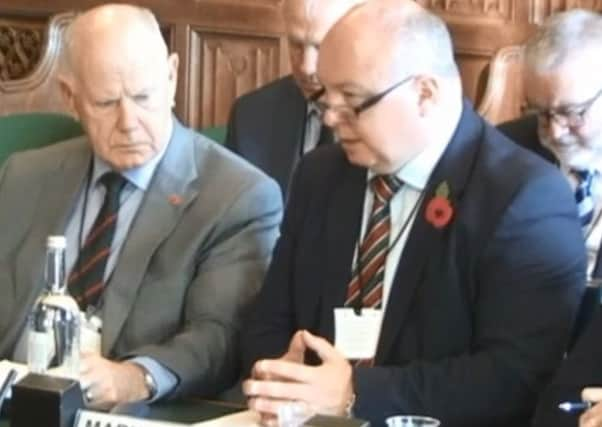Equating police officers with terrorists ‘offensive’, MPs told


The chairman of the Police Federation Northern Ireland, Mark Lindsay, described the proposals as “offensive” in London today.
Mr Lindsay, giving evidence to a Westminster committee, spoke out against “an intention to rewrite the history of 35 years of a terrorist campaign”.
Advertisement
Hide AdAdvertisement
Hide AdHe was joined by the chairman of the Northern Ireland Retired Police Officers Association, former senior RUC officer Raymond White.
Mr White warned a “tsunami” of allegations would require 600 extra detectives.
Mr Lindsay and Mr White were giving evidence to the Northern Ireland Affairs Select Committee at Westminster about proposals to deal with the legacy of the Troubles contained in an agreement reached in 2014.
The Stormont House Agreement, a settlement between the British and Irish governments and most political parties at Stormont, was focused on welfare reform, identity issues and government finance.
Advertisement
Hide AdAdvertisement
Hide AdBut it also proposed several mechanisms for dealing with the legacy of the Troubles — including the establishment of a Historical Investigations Unit.
Mr Lindsay told the committee: “We are concerned that Northern Ireland will be a place where police officers retire from sterling service to communities only to be automatically branded as suspects.
“There seems to be an intention to rewrite the history of 35 years of a terrorist campaign, equating the actions of terrorist groupings with the lawful actions of police officers.
“We see the bill as perverse because the proposals run the risk of equating the actions of murderers and bombers with the actions of those who worked to bring them to justice and create the conditions for peace.
Advertisement
Hide AdAdvertisement
Hide Ad“That is offensive as it could allow the terrorists to tell their story without fear of sanction or prosecution, delivering a one-sided narrative where their actions could be explained as somehow justified.”
Speaking to the News Letter after giving evidence, Mr Lindsay added: “A lot of the narrative around legacy issues at the moment are that it was the police or the military – but mainly the police – who controlled all these terrorist groupings through the use of informants or the misuse of informants. We see an attempt to say that when it comes to what the terrorists did that the police were no better. That is simply not true.”
Mr White, a former RUC assistant chief constable, warned that “nobody seems to have done any homework at all” on the number of people required for the proposed Historic Investigations Unit.
“It is not just police officers you are talking about,” he said.
Advertisement
Hide AdAdvertisement
Hide Ad“These are homicides that have to be revisited and reinvestigated, so you are looking at homicide detectives, and they are the cream of the cream.
“There is a massive shortage of those people in the whole of the UK at the moment.
“We have made a very crude estimate that, if you are going to work even roughly within the five-year timeframe, you are looking at about 650 detectives of that quality reworking these cases.”
Mr White also warned that the wider context of police investigations during the Troubles had not been properly taken into account.
Advertisement
Hide AdAdvertisement
Hide Ad“What is being investigated actually are unresolved murders that were all investigated at the time to the best of the police’s ability in the context of the time – and that was an armed conflict situation,” he said.
“Within a short period of time those who were at the crime scene were actually becoming targets themselves.”
He added: “A lot of material will never make it across the threshold of becoming evidence.”
Mr Lindsay said a “properly resourced PSNI would be the most effective mechanism to deal with historical cases”.